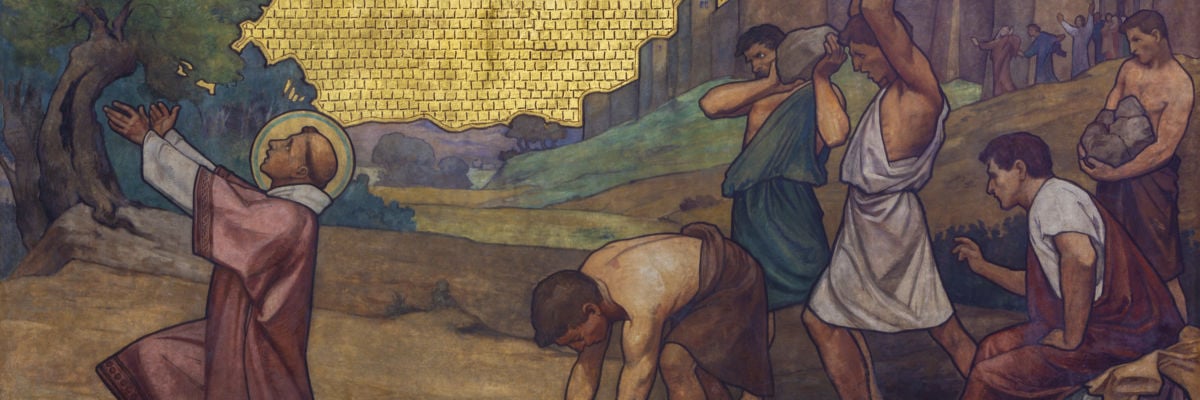
Homily for All Saints’ Day, 2020
When Jesus saw the crowds, he went up the mountain,
and after he had sat down, his disciples came to him.
He began to teach them, saying:
“Blessed are the poor in spirit,
for theirs is the Kingdom of heaven.
Blessed are they who mourn,
for they will be comforted.
Blessed are the meek,
for they will inherit the land.
Blessed are they who hunger and thirst for righteousness,
for they will be satisfied.
Blessed are the merciful,
for they will be shown mercy.
Blessed are the clean of heart,
for they will see God.
Blessed are the peacemakers,
for they will be called children of God.
Blessed are they who are persecuted for the sake of righteousness,
for theirs is the Kingdom of heaven.
Blessed are you when they insult you and persecute you
and utter every kind of evil against you falsely because of me.
Rejoice and be glad,
for your reward will be great in heaven.”-Matthew 5: 1-12a
The Doctors of the Church, especially St. Augustine and St. Thomas Aquinas, explained the “beatitudes” with which the Savior begins his Sermon on the Mount in great and profound detail. There is no room to go over their whole teaching here. Suffice it to say that the Lord begins his teaching with the ultimate goal of the Christian life: a holiness that leads to eternal happiness or beatitude. Today we will focus on the last beatitude, which is a summary of the other seven.
The first seven teach us what actions, under the influence of the virtues and gifts of the Holy Spirit, merit an eternal reward. The first three merit eternal life by overcoming a false kind of happiness found in possessions and worldly power, or in pleasures, or in the assertion of one’s own irascible will; the fourth and fifth by engaging in the active life of acquiring virtue and doing good to one’s neighbor; and the sixth and seventh in the contemplative life of knowledge of God and inner and outer peace of soul. Each happy-making action has its corresponding reward.
But the patient undergoing of persecution and trial is the summary of them all. We find this beatitude in the longer eighth one. This is simply because if we are able to stand up under trial and misunderstanding and persecution, we will surely observe all the other beatitudes, rejecting a false happiness and embracing the goods of the active life and the final heavenly contemplative life.
This is what made the saints into saints. St. Paul teaches in the third chapter of his second epistle to Timothy thus:
Indeed, all who want to live a godly life in Christ Jesus will be persecuted. But wicked people and impostors will go from bad to worse, deceiving others and being deceived. But as for you, continue in what you have learned and firmly believed, knowing from whom you learned it, and how from childhood you have known the sacred writings that are able to instruct you for salvation through faith in Christ Jesus. All scripture is inspired by God and is useful for teaching, for reproof, for correction, and for training in righteousness, so that everyone who belongs to God may be proficient, equipped for every good work.
All who want to lead a godly life in Christ Jesus will be persecuted! This is the plain truth for those who worship a crucified Savior, and have heard his invitation to take up the cross daily and follow after him.
Persecution takes on different forms. First of all, even if we are not being visibly or socially persecuted by other human beings, we are all pursued and tried by the efforts of the evil one. Temptation is a form of persecution by the evil one, and so it is that we pray in the Lord’s Prayer, “And lead us not into temptation, but deliver us from the Evil One” as the original Greek of the Gospels has it.
The devil is named Satan, or the “accuser,” since he seeks to reassure himself of our eternal loss by throwing up our sins before us and others, sowing discouragement and confusion wherever he can. Patiently enduring this suffering of struggle with temptation and repenting swiftly when we fail is our way of observing the eighth beatitude.
Faithfully meditating on the word of God found in the scriptures equips us for this struggle, since God’s word is, as the apostle tells us, a “two-edged sword” that can defend us from the attacks of evil men and of the devil who instigates their attempts to separate us from the way of Christ Jesus. Paul wisely reminds Timothy of this powerful spiritual armory, the knowledge of the scriptures.
The words of Sacred Scripture are an original devotion of Christians, a “sacramental” like praying the rosary or making the stations of the cross. They have power to defend our minds and our feelings from false goods and misplaced hopes and set them on the love of God and neighbor.
None of the saints made their way to heaven by following the Savior without being instructed and equipped and strengthened by God’s word. How can I endure persecution and so enjoy the reward of perseverance? How can I become a saint like all the saints whom we celebrate together today? Well, let’s start by taking out our Bible and reading it, examining the readings that the Church offers us each day for our defense and edification in a world of very bad news.
Then we can rejoice and be glad for our reward will be great in heaven. Let us begin with this daily intention, and then we will end very well indeed in the kingdom of the saints on high.



